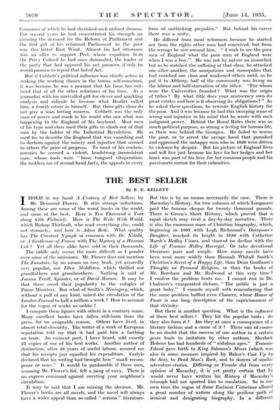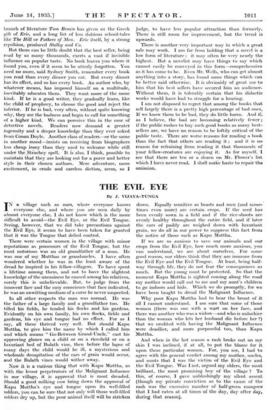THE BEST SELLER
By E. E. KELLETT
T HOLD in my hand A Century of Best Sellers, by I Mr. Desmond Flower. It stirs strange reflections. Among these are some of the worst books in the world, and some of the best. Here is Ten Thousand a Year along with Pickwick. Here is The Wide Wide World, which Bishop Thirlwall, who read everything else, could not stomach ; and here is Adam Bede. What quality has The Constant Nymph in common with Dr. Nikola, or A Gentleman of France with The Mystery of a Hansom Cab? Yet all these alike have sold in their thousands.
The riddle only seems the more difficult as I ponder over some of the omissions. Mr. Flower does not mention The Fountain, by no means an easy book, yet assuredly very popular, nor Ellen Middleton, which thrilled our grandfathers and grandmothers. Nothing is said of Joanna Traill, Spinster, or of David Harum. It may be that these owed their popularity to the eulogies of Prime Ministers. But what of Smith's Miningrey, which, without a puff of any kind, raised the circulation of the London Journal to half a million a week ? How to account for the vogue of works so unlike ?
I compare these figures with others in a contrary sense. Many excellent books' have fallen still-born from the press, for no assignable reason. Others have lived, in almost total obscurity. The writer of a work of European reputation told me that it had paid him a farthing an hour. An eminent poet, I have heard, sold exactly 25 copies of one of his best works. Another author of distinction, after 40 years of useful labour, assured me that his receipts just equalled his expenditure. Carlyle declared that his writing had brought him " small recom- pense or none." It would be pardonable if these men, scanning Mr. Flower's list, felt a pang of envy. There is no express command against coveting your neighbour's circulation.
It may be said that I am missing the obvious. Mr. Flower's books are all novels, and the novel will always have a wider appeal than so-called " serious " literature. But this is by no means necessarily the case. There is Macaulay's History, for two volumes of which Longmans paid the famous cheque for twenty thousand pounds. There is Green's Short History, which proved that a rapid sketch may rival a day-by-day narrative. There is also the enormous mass of Christian biography, which, beginning in 1809 with Legh Richmond's Dairyman's Daughter, reached its height in 1856 with Catherine Marsh's Hedl4 Vicars, and showed no decline with the Life of Frances Ridley' Havergal. Or take devotional literature pure and simple. HOw many novels have been read more widely than Hannah Whitall Smith's Christian's Secret of a Happy Life, than Dean Goulburn's Thoughts on Personal Religion, or than the books of Mr. Boreham and Mr. Redwood at this very time ? I confess the problem beats me. I cannot rest in Dr. Chalmers's exasperated dictum, " The public is just a great baby." I console myself with remembering that the same problem baffled even Chaucer, whose House of Fame is one long description of the capriciousness of that divinity.
But there is another question. What is the, influence of these best sellers ? They hit the popular taste ; do they also form it ? Are they at once a consequence of a literary fashion and a cause of it ? There can of course be no doubt that the success of one author in a certain genre leads to imitation by other authors; Sherlock Holmes has had hundreds of " sedulous apes." Treasure Island gave birth to King Solomon's Mina (which was also in some measure inspired by Baker's Cast Up by the Sea), to Dead Man's Rock, and. to doiens of similar adventure-stories. 'Differing* as Fronde did from every opinion- of Macaulay, it is yet pittty certain that he would never have written his History if Macaulay's triumph had not spurred him to emulation: So in our own time the vogue of Some Eminent Victorians allured a great number of writers along the perilous path of ironical and denigrating biography., In a different branch of literature Tom Brown has given us the- Greek gift of Eric, and a long list of less dubious school-tales like The Hill or Fathers of Men. Eric itself, by a strong repulsion, produced Stalky and Co.
But there can be little doubt that the best seller, being read by so many thousands, exerts a vast if invisible influence on popular taste. No book leaves you where it found you, even if it seem to be utterly forgotten. You need no more, said Sydney Smith, remember every book you read than every dinner you eat. But every dinner has its effect, and so has every book. An author who, by whatever means, has imposed himself on a multitude, inevitably educates them. They want more of the same kind. If he is a good writer, they gradually learn, like the child of prophecy, to choose the good and reject the inferior. If he is bad, very often, without quite knowing why, they see the badness and begin to call for something of a higher kind. We can perceive this in the ease of detective novels. Readers " now demand a greater ingenuity and a deeper knowledge than they ever asked froM Conan Doyle.' Another class of readers—or the same in another mood—insists on receiving from biographers less cheap irony than they used to welcome while still under theStachey spell. It is also, I think, possible to maintain that they are looking out for a purer and better style in their chosen authors. Mere adventure, mere excitement, in crude and careless diction, seem, so I judge, to have less popular attraction than formerly. There is still room for improvement, but the trend is upwards.
There is another very important way in which a great sale may work. I am far from holding that a novel is a low form of literature ; it may often be very nearly the highest. But a novelist may have things to say which cannot easily he conveyed in this form—comprehensive as it has come to be. Even Mr. Wells, who can get almost anything into a story, has found some things which can be better said otherwise. It is obvimisly of great use to him that his best sellers have secured him an audience. Without them, it is tolerably certain that his didactic works would have had to struggle for a hearing.
I am not disposed to regret that among the books that sell largely there is a pretty high percentage of bad ones. If we know them to be bad, they do little harm. And if, as I believe, the bad are becoming relatively fewer ; if the public rushes to buy such good books as many best- sellers are, we have no reason to be loftily critical of the public taste. There are worse reasons for reading a book than the fact that others are reading it ; and it is no reason for refraining from reading it that thousands of your fellow-creatures are enjoying it: As for myself, ''I see that there are ten or a dozen on Mr. Flower's list which I have never read. I shall make haste to repair the omission.



















































 Previous page
Previous page